Brit & Co named THE BOOK OF DOG one of the “ten best feminist books of 2018!”
I’m very happy to be in the company of these other authors and their books.
Brit & Co named THE BOOK OF DOG one of the “ten best feminist books of 2018!”
I’m very happy to be in the company of these other authors and their books.
I’ve read Leave the World Behind three times and each time I love it more. It took me a while to get used to its voice–sardonic and even a little bit mean, as well as being outrageously, unapologetically omniscient. It’s a voice that I’ve more or less been schooled to distrust in this postmodern world. Once I tuned myself to this novel’s unique rhythms, though, both the story and the storytelling became explosively alive for me.
I needed to learn how to read this novel. I needed to overcome my natural likes and dislikes to fully appreciate its genius. For example, one thing I typically don’t have patience for in novels is long lists of stuff. Authors seem to like lists a lot but usually they seem kind of lazy and unnecessary to me. Alam uses this technique to perfection in chapter 3, though, when he lists all the things Amanda puts in her grocery cart. It shouldn’t be riveting, but it is. Each item Amanda chooses off the shelves gives me one more angle to view her character, and by the end I understand her limitations, and her self-image, and the ways she feels most vulnerable. All from a bunch of food items. It’s extraordinary writing.
My favorite novel published in 2020. It won me over. It snuck up on me.
Note with spoilers 2/16: (view spoiler)[I’m diving in for a fourth time, honestly, I’m fascinated by this novel and how it works. This time I’m listening to the audiobook. The narrator is really good.
It’s a very complex book in terms of craft. At first it’s written in a way that you assume it’s one of those big social novels like The Corrections, and then it morphs into something more stark, some kind of an examination of privilege and race and prejudice…and then there are a series of ever-more-horrific encounters, all of which never spill over into the expected violence, AND THEN it leaps into a seriously gorgeous meditation on what-might-be-next if and when the rarified world we live in collapses.
I don’t say “gorgeous” too often about novels and the way they’re written. The flamingos in the pool. The deer moving in huge herds. Rose in the woods, and the little fire of hope the author puts out there for us readers, when he assures us that she’ll survive. And that through her something meaningful will survive.
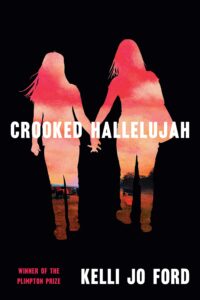
Crooked Hallelujah is brave novel that sheds light on contemporary American life in surprising and meaningful ways. It first came to my attention after a friend of mine commented that the novel was garnering a number of online reviews from book bloggers who were complaining about the book’s lack of Native-American-ness. This repeated complaint created brain-dissonance in both my friend and me, since Kelli Jo Ford is a citizen of the Cherokee Nation of Oklahoma, whereas the reviewers complaining about her book’s lack of an authentic Native American voice were white. I mean, come on.
This novel is to be praised first and foremost for its complicated, heartbreaking examination of the limited and self-damaging choices women have when they live in poverty–especially when they are raising children in circumstances that offer very little hope. There are so few literary novels written from the perspective of poverty, when it’s one of the existential crises of our age. The novel gives nuance and humanity to characters who are living on the bleeding edge.
The novel is also to be cheered because it’s a serious literary work that tackles head-on the sometimes-redemptive, frequently-damaging nature of religious conviction in modern life. Not since Jamie Quatro’s Fire Sermon have I seen the topic of religious faith dealt with so well in literary fiction (or at all, frankly). The outsized effect that religion has on American culture today is almost never given its proper weight in contemporary fiction, and I welcomed the insights Ford wrote into her story here.
I know that “brave” is a word so overused in author blurbs that it might provoke cynicism in a review, but if you can remember the original meaning of “brave,” that’s what this novel is.
View all my reviews

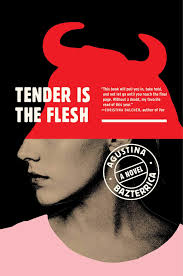
UK: Pushkin/US: Scribner
Tender Is the Flesh by Agustina Bazterrica is one of the most relentless and ugly books I’ve ever read. The story about a society where humans are slaughtered for meat is presented in more detail than I was ready for, and the novel willfully refuses to allow itself to fall into any category of fiction that would make it easier to take as a reader. The flat direct style of its prose didn’t allow me as a reader to classify it, as I read along, as horror, or satire, or a metaphorical representation of social injustice, or a nihilistic moral thesis about humanity. It is exactly what it is. Never boring, it managed to continue to shock me until its final pages.
In 2010 Roger Ebert reviewed the cult movie The Human Centipede and wrote:
I am required to award stars to movies I review. This time, I refuse to do it. The star rating system is unsuited to this film. Is the movie good? Is it bad? Does it matter? It is what it is and occupies a world where the stars don’t shine.
That goes for this novel, as well. If forced to give stars, I would give it five stars, for the way it relentlessly fulfills its purpose.
I review more books on Goodreads than I post on my blog, and you can read all of my reviews there.
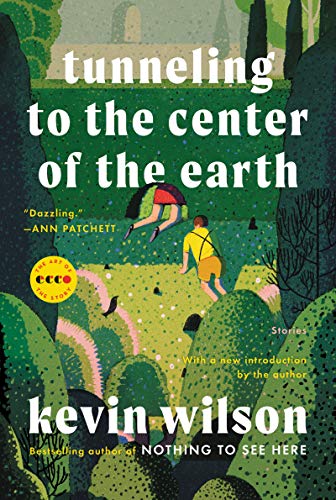
Tunneling to the Center of the Earth: Stories
by Kevin Wilson
After Kevin Wilson’s most recent novel NOTHING TO SEE HERE worked its peculiar charms on me, I found myself thinking, oh my god, where did this Kevin Wilson person come from? And now I know. Here he is, shining forth in his first collection, published in 2009 and soon to be republished by Ecco in September 2020. Or maybe I should say, “bursting forth” or even “exploding forth,” because there is a story here even in this first collection, a decade before Nothing to See Here, that has people spontaneously combusting in it. Unlike in Wilson’s recent novel, the combusting people blow up without any warning flames flaming up beforehand. They just go boom, in the story “Blowing Up on the Spot.” There are other body horrors in the other stories, and these are just as charming, and I really do mean “charming,” because the explosive transformations that happen to Wilson’s characters always seem a little on the light-hearted side even when they end in death.
It’s hard to say what I would have thought about these stories without coming to them back through time, via Nothing to See Here. I can’t imagine it because the novel had a big impact on me. But as ‘origin stories’ of Wilson’s proclivities, hangups, and obsessions, I loved these stories.
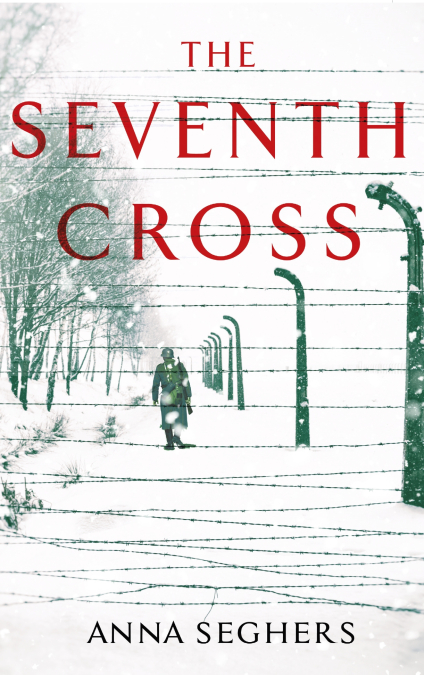
I just finished re-reading the magnificent 2018 translation by Margot Bettauer Dembo of The Seventh Cross by Anna Seghers, published by Virago. What was already a good novel in the original English translation has become an extraordinary novel in this new translation.
The author describes with exquisite and humane detail the insidious beginnings of Hitler’s rise in Germany, from the point of view of ordinary Germans. It’s difficult to describe just how different this novel is from most contemporary literature. It is an ensemble novel with dozens of characters, many of which are present for just a scene, or a paragraph. And yet each has a unique humanity.
The novel does have a hero–an escaped political prisoner by the name of George Heisler–but rather than being the focal point of the story, George, and the escape path he travels through this novel, are like the loom that the real story weaves itself around. The real story here is told in the countless vignettes of ordinary human beings who are just waking up to the threat of National Socialism. They are good people, but they are “good” in ordinary and unremarkable ways. They aren’t heroes as much as they are people reacting to circumstances, moment to moment, almost always surprising themselves, either with their own cowardice or with their own selflessness.
The small choices people make in this time of relative peace, whether to aid an escaped political prisoner or not, whether to ignore the growing terror all around them or acknowledge it, whether to put self-interest before all else or choose some other path–all play out in myriad ways. By the end I had had many chances to ask myself the question “what would you do in that situation?”
Author Seghers was a Jew and a Communist who escaped Hitler’s Germany, and published this novel in Mexico where she was in exile. One of the most interesting characters to me was the only Jewish character in the novel, Dr. Loewenstein, a character who still practices medicine freely in this time in Germany’s history, the mid-30’s, although he is clearly an outcast; he is the doctor patients see only when the other doctors in town can’t help. George Heisler comes to Loewenstein for help with a septic wound, and what is not said between the two men speaks volumes.
What I love most about The Seventh Cross is that it documents the insidious beginnings of unjust imprisonment and paranoia in pre-WWII Germany. Jews in the book are still relatively free but required to wear a yellow star, and the death camps have not yet been built; the victims in this book are the political prisoners, and the camps they are held in are make-shift affairs at the edge of town. Anna Seghers was Jewish and a Communist, an author who returned to East Germany after the war, and although this book was hugely popular in the U.S. just after publication and was even made into a movie starring Spencer Tracy, it fell out of print in English with the advent of the Cold War. Thank you Virago for bringing it back so magnificently.
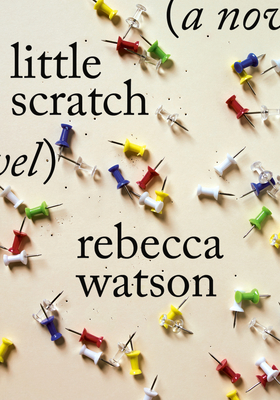
Little Scratch by Rebecca Watson
Rebecca Watson’s new novel little scratch made made me work hard, and I’m not sure it has a ‘payoff’ in a traditional novelistic sense. And yet it has its own rewards, for a patient reader. The language is spiky and fragmentary and the storytelling style approaches its subject–a woman trying to cope with the trauma of sexual abuse–in a manner that mirrors that shattering dislocation.
Many of the pages scan like poetry, which made me want to slow down and read it like a poem. But then I realized that a faster reading pace–the pace of thought–was a much better way to appreciate the novel, and to grasp its meanings. I needed to train myself to read this book.
I also needed to stop questioning what the author is up to, and whether she succeeds. I needed to drop all judgment and expectation. As I read, I kept comparing the novel with other literary experiments with stream-of-consciousness and/or auto-writing, and finding this novel to be relatively artless by comparison, but I just needed to cut it out. I’m comparing it with, you know, Virginia Woolf and James Joyce and perhaps a bit with Gertrude Stein, and in all of these authors’ cases their language is no longer surprising…we’ve learned how to read Joyce by now, like the way we learned to hear Stravinsky without throwing rotten fruit at the stage and walking out, When I began the novel I didn’t know how to read Rebecca Watson. By the end. I did, which makes it a perfect candidate for a re-read.
I review on Goodreads and just post the most exceptional reads here on my blog…if you like feel free to link here to see all of my reviews.

Oh my goodness. This book is incredibly fine. Now I know what the phrase ‘razor sharp wit’ really means. On a sentence level the novel delivers one perfect zinger after another. Dolan is particularly good at capturing the way men talk to women whom they mistakenly think are not as smart as they are. The dialog is brilliant throughout. You have to understand that this is the kind of story I have very high standards for because the plot is an evergreen plot: young person at loose ends making her way in the world and deciding who to love. And yet it’s so original. I dove right in and read from beginning to end, and now I’m giving thanks that such a book exists in the world—light, sweet, sad, true.
View my reviews on Goodreads, if you like ~ it’s where I like to post all of them, saving the very specialist books for this blog ~

Tyll by Daniel Kehlmann is so entertaining that I struggled at first to understand just how deep it is. I’m not sure what it says about contemporary literature, or about me, that I needed to consciously banish my cynical mistrust of any book that is so delightful to read.
As I read the novel I thought of Falstaff, Shakespeare’s comic-yet-deep repeating character. The character who most reminded me of Falstaff is played by a donkey, a character who appears in many scenes, sometimes for comic value and sometimes for something else entirely.
And now that I’ve brought it up, I realize that I could now write several paragraphs just about the donkey in this novel–how funny the donkey is in a given scene, and then how horrifically the donkey’s fate plays out in another scene. Sometimes this donkey has a name, and its name is Origenes. And like so much in Tyll, Kehlmann invites me to think of the donkey’s name as just a name, and to read on, or alternatively, to ponder what shimmering potentials are added to my reading if I take time to realize “Origenes” is also the name of an itinerant third-century Christian ascetic whose life and fate were caught up in religious disputes not unlike those raging in this novel.
The donkey’s story is threaded throughout this broken, nonlinear novel, and always brings with it some new wonder or terror or sadness or revelation, even though it’s a minor character, like Falstaff. And the thing is, it’s not just the donkey. Every character in the novel is a kind of itinerant bit player, and every one of them–the miller Claus, the Winter King, the expert in dragonology, the little girl named Martha, Tyll himself–has a marvelous and mysterious story to tell, when it’s their time on stage. Kehlmann made them all real for me, sometimes in just a few sentences.
References to Shakespeare plays appear throughout this novel with both historical and thematic resonances. A recurring side-theme is how literature was changing in this period of history that we now call “early-modern.” The play Macbeth makes its way into a scene as a way to reference James I’s rise to power, and Macbeth’s last soliloquy is a good description of how this novel unfurls as you read it:
Out, out, brief candle!
Life’s but a walking shadow, a poor player,
That struts and frets his hour upon the stage,
And then is heard no more. It is a tale
Told by an idiot, full of sound and fury,
Signifying nothing.
Okay. I should also add that I found a lot of Lutheran-like philosophy playing out in profound ways–over and over again the character Tyll projects a belief that suffering and uncertainty is worth enduring for the hope of living through it, and that evil is worth fighting, for the hope of the good to come. This philosophy is most starkly portrayed in the late chapter “In the Shaft.” But every chapter seems to have something profound to say about hope, and humanity.
Well, I’m just gob-smacked by this novel. Read it.
here are more of my reviews on goodreads.
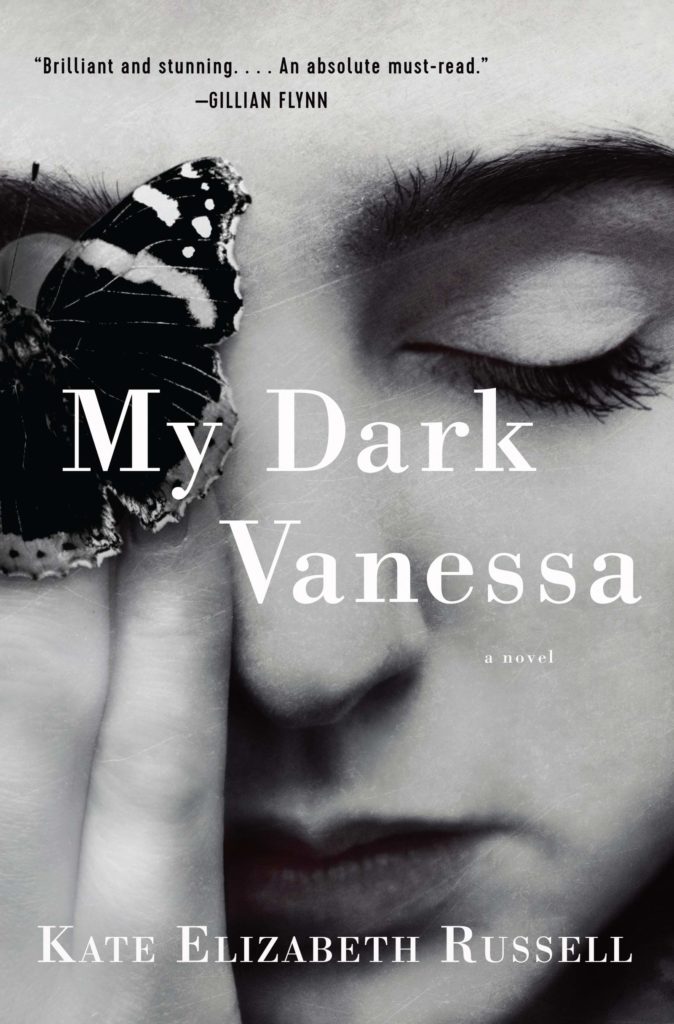
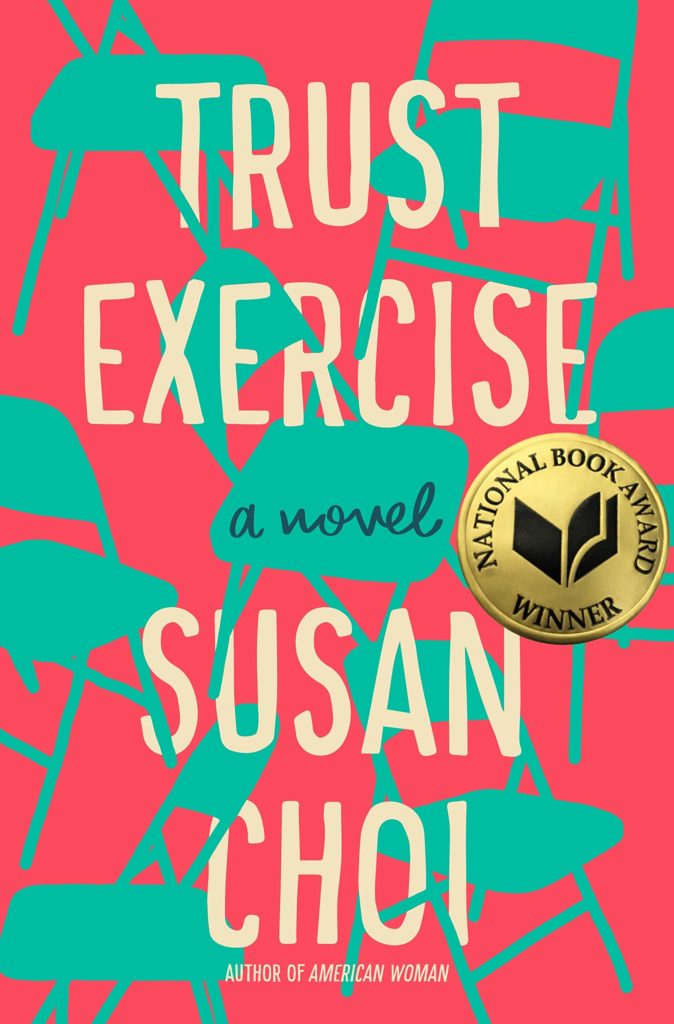
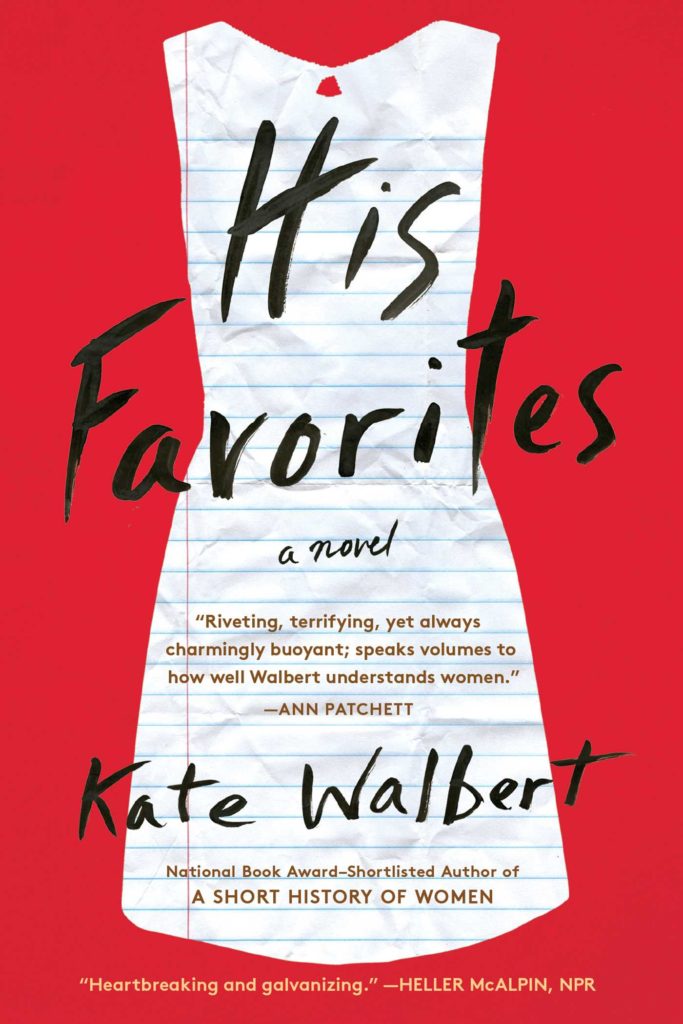
Somehow His Favorites by Kate Walbert escaped me last year, and it wasn’t until I read a review of the much-reviewed My Dark Vanessa, in which Walbert’s novel was mentioned, that I sought it out. It’s a marvelous, humane novel that perfectly captures the loneliness, confusion, and long-term effects of childhood sexual abuse.
I was overwhelmed by the novel’s narrative power, and by the story told through Jo’s eyes. Every character is so richly drawn. The mentality of being fifteen, and how adults treat a fifteen year old girl, is captured here so vividly. Scene after scene is written with such confidence, in a way that’s both delicate and devastating. Every word seems perfectly chosen, not in a fussy-perfect way, but in a way that one word propels the story forward to the next word, and the next, in support of the story the author wants to tell.
I’m trying to think of another author who achieves such a sensitive balance of inner life and outer realities in their writing, and I come up with Ali Smith. I suppose there is a bit of resemblance to Anna Burns’s narrator in Milkman here, too, in the way I feel the humanity and the heart of Walbert’s Jo, her spirit singing out on every page, even as she is describing such a desperate time in her life. But Walbert is her own voice. This is a perfect little book.
My Dark Vanessa is also about a fifteen year old girl and her much older abuser, and what Russell tries to accomplish here is complicated–she endeavors to give a sense on the page of how young girls, young victims–can feel, or be made to feel, entirely empowered by the interest of much older men, a misinterpretation of their situation that can lead to complicated feelings in their adulthood, of volition vs. coercion, and of sexual power vs. sexual abuse.
I admire the goal and found the novel interesting if not entirely satisfying. I wish Russell had spent more time reading and studying Nabokov, whose literary presence haunts this novel. I wish she had studied the dark subtlety at work in Lolita, and the way Humbert never quite does more than imply. For me the novel had too many uncomfortable, rapey sex scenes in it. Russell wants us to feel uncomfortable, but to me it felt too much. That’s not necessarily a prurient comment–I think the sex writing is a literary flaw, because there is no way such a repressed character as this narrator would reveal so much, and the graphic frankness in many scenes runs the danger of skirting the border of soft-pornographic territory, which is exactly the territory that the author wants to avoid.
All that said, there is something powerful at work here. Russell writes a credible first-person account of a child as she is being groomed, and who is unaware of that reality. I admire this aspect of the novel.
And then there is Trust Exercise.
To tell the truth, I’m not sure what happened in this novel. The meta fictional jolt that comes between parts one and two made me skeptical, reading forward, whether anything in the novel is meant to be considered “the truth” or whether every section merely presents another fictional construct. Of course it’s all fiction and such mental wanderings in a way just prove once more how tricksy fiction can be. And I believe Choi here is primarily interested in exploring the ways women process their abuse, including denying it happened at all, rather than she is interested in writing a #metoo story. At the end of this novel I’m not even sure who was abused by whom, or how many babies were born. Are all the men in this book ephebophiles? I feel metaphorically violated by this novel, similar to the way Choi metaphorically violates her fictional creations. That’s not necessarily a bad thing. The novel upended me. And I don’t believe this novel is meant to be pinned down, even if many of its positive reviewers seem to claim to know exactly what it’s about. It unsettled me. And it left me wondering why I haven’t read more of Choi’s books, which until now have been on my metaphorical shelf of all the authors I mean to read, very soon, along with Francine Prose, Mary Gaitskill, and Cynthia Ozick.

A woman gets pregnant unexpectedly, just as the world careens toward a the most horrific eco-disaster you can imagine. The writing is great, the emotional landscape is truthful, and I’m going to read everything Naomi Booth writes from now on.
My fondest delight, when it came to my reading experience with this novel, was the birth scene. I don’t think it’s much of a spoiler to say there is a birth scene, since the whole book before then is the story of a ponderously pregnant woman searching for a safe place to give birth, while simultaneously coping with some seriously creepy eco-disaster action.
This birth scene, when it comes, is magnificently done. Ok, it ignores the way that every contraction, in actual birth, is a peak experience of sorts…but even without that explicit kind of veracity, the scene captures the deep-heart horrific truth about birth. It captures what it’s like to have your body taken over by a primal force over which you have no control. No matter how great a woman’s individual birth experience might be (or how great she happens to remember it being, later, when it’s over), every laboring woman comes to understand at some point (unless she is utterly etherized), that her body is no longer hers…and that realization can be momentarily disorienting, or completely terrifying, depending on how you feel in general about experiencing a total loss of control of your body. Naomi Booth nails it.
So at the heart of this eco-horror-fiction Naomi Booth has slyly written the best metaphor for birth-terror that I’ve ever read.
Yeah!
Go, Naomi Booth!
I’m a fan.
on goodreads you can read all my reviews including those I don’t post here.